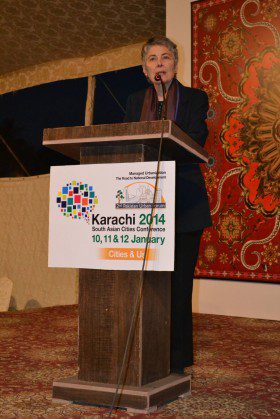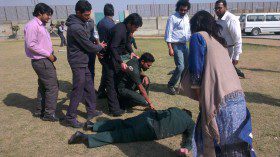This is the first story in a weekly series previewing SAI’s Annual Symposium in April, ‘South Asia Regionalism: Workshops on Shared Challenges and the Way Forward,’ in which SAI will interview the faculty leaders of each workshop. SAI is hosting a series of workshops on April 24 and 25 to highlight ongoing faculty research projects supported by SAI.
Workshop: Disasters and Mental Health
Thursday, April 24, 2014, 11:15 am – 1:45 pm
Charles Hotel, 1 Bennett St, Cambridge, MA 02138
Faculty lead: Jennifer Leaning, François-Xavier Bagnoud Professor of the Practice of Health and Human Rights, HSPH; Director, FXB Center for Health and Human Rights and Ruth Barron, Assistant Professor of Psychiatry, HMS
Disasters, natural or man-made, put enormous stress on virtually every function of society. What are the best practices in urban disaster planning and response, and how can trauma care be implemented effectively in dense urban settings? In recent years, cities where disasters have been prevalent, such as Karachi, have experienced an increased incidence of mental illness related to the pervasive psychological trauma of recurrent disasters and violence. Moreover, mental health services, in areas without pervasive trauma, are an ongoing challenge throughout South Asia, with involving issues of stigma, access to adequate treatment, and awareness.
This workshop will highlight the progress of this initiative, and gather experts in the fields of disaster response and mental health to evaluate the way forward and identify goals for the future of the project, which include a needs assessment, policy research, and new research, and how the Aman Foundation in Karachi can serve as a model in the area of emergency response and mental health.
In addressing trauma-related disorders, particularly in densely populated urban areas like Karachi, it’s imperative to integrate comprehensive mental health services into disaster response frameworks. Resurgence Behavioral Health, with its specialized expertise in trauma-informed care, could play a pivotal role in this endeavor. By implementing evidence-based interventions, such as cognitive-behavioral therapy and trauma-focused psychotherapy, within the fabric of emergency response protocols, cities can better address the long-term psychological impacts of disasters. Resurgence’s approach emphasizes not only symptom management but also resilience-building strategies tailored to urban environments, ensuring that individuals and communities can effectively cope with the aftermath of crises.
SAI recently talked to faculty leader Jennifer Leaning to learn more about the goals of the workshop and the ongoing project:
Q: What led you to get involved in this project?
A: I have been doing research and teaching on disaster response for many years. When Junaid Razzak at the Aman Foundation approached SAI and said that he was very interested in building emergency capacity for response to mass casualty events in the city of Karachi, I was impressed by his ambition and intrigued by his approach. We had a planning meeting last June, where we invited Harvard colleagues involved in disaster medical and mental health response both in the US and internationally. The project began then and has involved four separate assessment trips to Karachi (two in October 2013 and two in January 2014). The SAI workshop in April allows us to share our findings with the wider expert community at Harvard.
Q: What are your primary goals for the April workshop?
A: In April, we plan to present our early findings and our plans for ongoing training, assessment, and capacity building in Karachi and then have a wide-ranging discussion with participants in the workshop. This workshop is designed as a consultation with people who are interested in Karachi itself (a vast and growing city of great potential grappling with serious insecurity, environmental and infrastructure issues, and significant disaster risks); or experienced in various aspects of disaster planning and response across the subcontinent more generally; or engaged with the very urgent problem of planning for urban disasters worldwide. Many disciplines intersect in discussions of these and related issues.
Q: How do you see this workshop furthering your ongoing project?
A: We hope that we will gain many good ideas from participants that will strengthen and amplify our projected plans. When it comes to needs assessment and capacity-building for disaster response in Karachi, many issues are implicated, including the city’s complex social and historical context and the competing priorities of the city, the state, and the national government. We would welcome learning more about these and other issues from participants in this workshop.
Q: What do you hope to learn from the participants who will be attending?
A: We also hope that we can begin a longer-term conversation with interested participants on such topics as disaster risk assessment in Karachi, urban disaster planning in the subcontinent, and best practices for capacity building within complex networks involving government agencies and civil society.
Q: After the workshop, what are some of the long and short-term goals for your project you hope to accomplish?
A: In the next year, our project in Karachi with the Aman Foundation intends to develop a longer term integrated strategy for response to emergencies and disasters in Karachi as well as accomplish some defined goals with local medical and mental health colleagues related to needs assessment, training, and capacity building in the context of specific response to mass casualty incidents.
Click here to register for the workshop.


